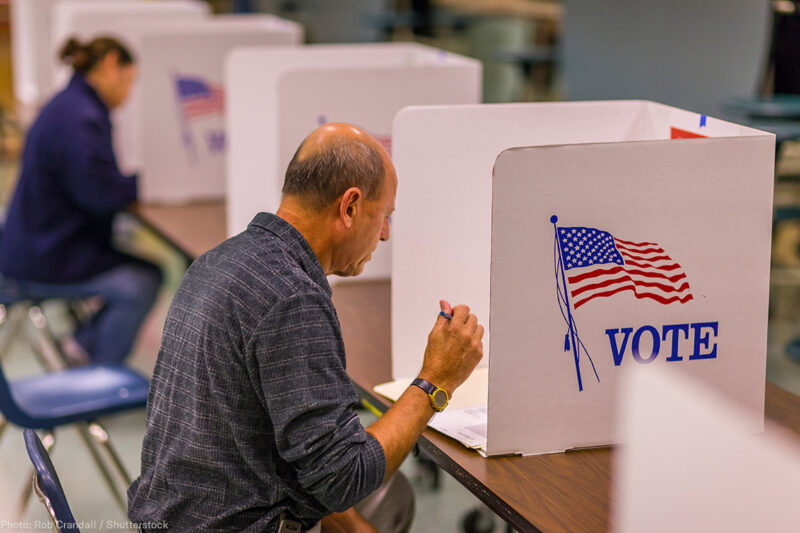On Election Day, the Voters of New Hampshire Can Protect Their Privacy in the Digital Age


“Live free or die.”
As reflected in its official state motto, no state has unequivocally embraced the principles of liberty and privacy more than the state of New Hampshire. These ideals make up the core of the state’s philosophical DNA. It is therefore surprising that New Hampshire is conspicuously missing from the list of the 10 diverse states that have explicitly enshrined the right to privacy in their constitutions. But on Election Day, Granite State voters will have a chance to remedy that oversight.
Earlier this year, the New Hampshire Legislature passed by a necessary two-thirds vote a proposed amendment to the state constitution guaranteeing the right to privacy in the digital age. Now it’s up to voters to enshrine that natural right. New Hampshire’s ballot Question 2 (Q2) would do just that by adding simple but mighty language to the constitution: “An individual's right to live free from governmental intrusion in private or personal information is natural, essential, and inherent.”
The risks to personal privacy are certainly greater today than they were when Gen. John Stark wrote — “Live free or die. Death is not the greatest of evils.” — in an 1809 letter to his fellow veterans of the Battle of Bennington, a turning point in the American Revolutionary War. Today’s powerful surveillance technologies can provide the state government and state and local law enforcement agencies with the ability to spy on people when they walk on public sidewalks, drive on public roads, play in public parks, attend public schools, and visit public libraries. They can track you using your own cell phone like a GPS device. They can access your internet search history and social media accounts, and they can read your text messages and emails.
Without state constitutional protections, privacy is not the Granite State’s default setting. Rather, it needs to be repeatedly established, protected, and defended by the state legislature each time a new surveillance technology or method is established, which is a common occurrence in our modern technological world. State legislators should not play an endless game of Whack-A-Mole against threats to their residents’ privacy. Relying exclusively on piecemeal statutes or search and seizure provisions written before the dawn of the internet is no way for New Hampshire to protect privacy.
To be sure, the Fourth Amendment to the United States Constitution provides every American with privacy rights. But in New Hampshire, where the right to privacy is a bedrock, nonpartisan political value, the U.S. constitutional right to privacy should be considered a floor, not a ceiling. That is why it is high time for the voters of New Hampshire to follow their legislature’s lead by voting to guarantee an explicit right to informational privacy in the state constitution.
Understandably, some New Hampshire voters may find it hard to believe their state does not already have the nation’s highest privacy standards, but a simple examination of current state law reveals that it does not. For example, while Part I, Article 19 of the New Hampshire Constitution provides some privacy protections in the arena of police investigations, if Q2 were adopted, the constitution would provide much broader protection against a wide array of potential governmental intrusions into private, personal information.
Q2 would require that the government obtain a judicial warrant, supported by probable cause, before accessing any personal information. If contested, the government would need to show a compelling state interest in obtaining access to that information before a court would allow the government access. This is not intended to be an insurmountable burden, especially when public safety is legitimately at risk, but it will serve as an important speed bump — and, from time to time, an all-out stop sign — on the road between the government and your private information.
Q2 would also help prevent the police from accessing your private information through third parties. For instance, Q2 would deny the police access to any account held by your internet service provider unless you provided your ISP with a waiver or the police obtained a warrant. This principle applies to an array of circumstances where a third party has not obtained your consent to turn your personal information over to the police.
Put simply, adopting Q2 would fill important gaps in current statutory privacy protections and would provide automatic privacy protections regardless of what the next wave of surveillance technologies and techniques bring. Nothing could be more consistent with New Hampshire’s legacy of cherishing individual liberty. This November, New Hampshire voters should vote yes on Ballot Question 2.
Every day across the nation, the ACLU is called on to defend all the freedoms guaranteed in the Constitution and the Bill of Rights. There's never been a more important time for to support the ACLU and our effective work to protect civil liberties. If you like what you just read, help us continue to speak freely by donating today.



